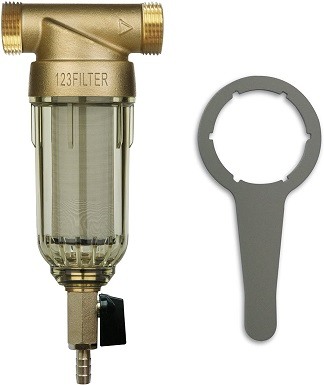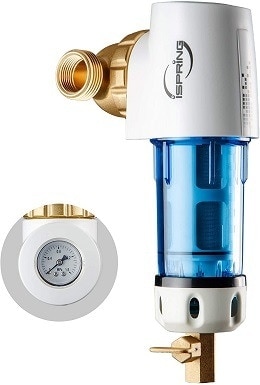5 Best Sediment Filters for Well Water in 2025 – Reviews & Top Picks
-
Pete Ortiz
- Last updated:
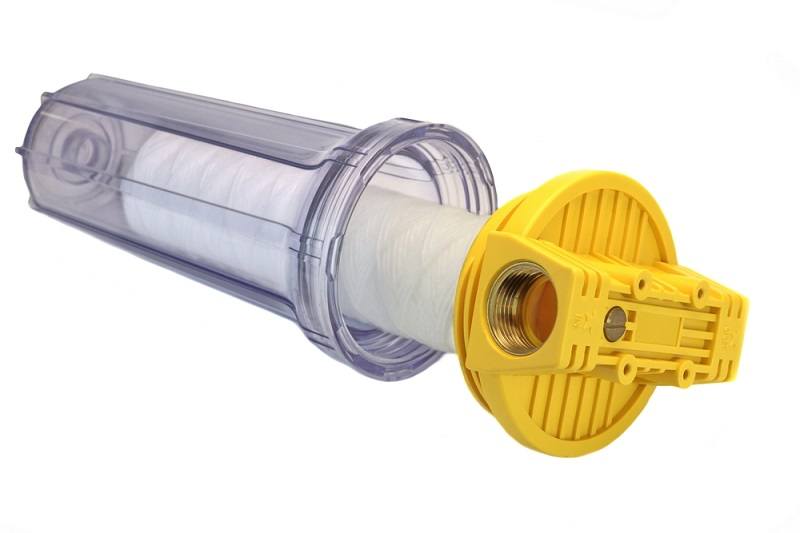
Nature can do many things but can’t provide filtered water from a well. If you get water from a wall, sediment can cause several problems. Sediment consists of anything from fine sand to rust, which can ruin tap water’s flavor, smell, and look. It can also ruin your sinks and water-based appliances. That is why it is important that you invest in a sediment filter to eliminate the particles.
We have created a list of in-depth reviews of five of the best sediment filters available for homes with well water. These are commonly used with whole-house filtration systems and combine with carbon and other filters to provide total filtration. There are several filters available, but with our reviews, you can find the most suitable sediment filter system for your home.
A Quick Comparison of Our Favorites in 2025
| Rating | Image | Product | Details | |
|---|---|---|---|---|
Best Overall

|
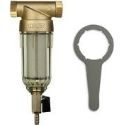
|
iSpring WSP-500 Sediment Water Filter |
|
CHECK PRICE |
Best Value

|
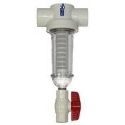
|
Rusco NT100-100P Sediment T-Style Water Filter |
|
CHECK PRICE |
Premium Choice

|
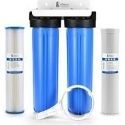
|
iFilters Well Water Filtration System |
|
CHECK PRICE |
|
|
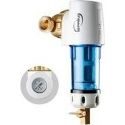
|
iSpring WSP50GR Sediment Water Filter |
|
CHECK PRICE |
|
|
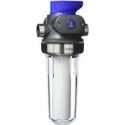
|
Culligan WH-S200-C Whole House Sediment Water Filter |
|
CHECK PRICE |
The 5 Best Sediment Filters for Well Water
1. iSpring WSP-500 Sediment Water Filter – Best Overall
The WSP-500 sediment water filter from iSpring has a 500-micron screen. It prevents sedimentary particles from passing and is designed to be part of a multi-stage, whole-house filter system. It is flushable, which means that the filter can be reused. Regular flushing also helps maintain high performance from the WSP-500 for longer.
The 500-micron mesh is made from stainless steel and includes a brass reinforcement head. The filter will support water up to 100°F and with pressure between 20-100 PSI. The company estimates that the filter will last up to 2 years. Despite the high-quality materials, which include see-through housing that makes it easier to monitor the system, it is very affordable compared to other models.
Our one gripe is that it doesn’t filter out iron very well. Despite that, we think it is the best overall sediment filter for well water available this year.
- Good price
- See-through housing
- Brass reinforcement head
- Flushable and reusable
- Two-year life
- Not as effective on iron as other sediments
2. Rusco NT100-100P Sediment T-Style Water Filter – Best Value
The Rusco NT100-100P is a 1-inch mesh PVC spin-down sediment filter. It operates with a maximum pressure of 150 PSI, and the 100-mesh filter is suitable for filtering grit from a new well or fine sand from existing wells.
As water is passed into the spin-down filter, it passes through the head, which directs the water to circulate through the housing. This centrifugal force catches sediment particles within the filter mesh and removes them from your well water.
Like the iSpring, the Rusco is flushable and reusable. Compared to the iSpring, however, it is all made from plastic and doesn’t feel as strong or durable. It performs well at removing sediment from well water, but we found that the plastic valve leaked on installation. It requires Teflon tape around the threads to minimize the risk of this leakage. However, for the money, the Rusco is the best sediment filter for well water for the money.
- Cheap
- Flushable and reusable
- Centrifugal removal of debris
- Does a good job of removing sediment
- All plastic design not durable
- Leaking around the seal
3. iFilters Well Water Filtration System – Premium Choice
The iFilters filtration system is a whole-house system that includes the housing and a two-stage sediment filter. It has a pressure-release button, which makes replacing the filter simpler and less messy. It is a compact unit for a whole-house system, and the inclusion of the filters, as well as the housing, helps keep costs down.
Unfortunately, when it comes time to replace the filter, your options are limited. The manufacturer states that you can only use iFilters’ replacement filters. The filtration system uses a 30-micron pleated sediment filter, and the screen can be washed and reused, which prolongs the life of the filter and also ensures that you can keep the system running at optimal levels.
The kit includes everything you need for installation: a heavy bracket, housings with a pressure relief button, and a wrench. It is the more expensive option on the list, but it is a whole system that includes the housing, filters, and brackets.
- Two-stage sediment filtration system
- Everything is included
- Reduces chlorine and heavy metals, as well as sediment
- Expensive
- Only works with iFilter’s own filters
4. iSpring WSP50GR Sediment Water Filter
The iSpring WSP50GR has a stainless-steel mesh that is rated at 50 microns. It uses centrifugal force by directing water after passing it into the filter housing. The filter cartridge and housing can be easily cleaned, and the double-sided scraper ensures that the unit is thoroughly cleaned, which helps prevent the clogging of the next filter stages.
This unit has a 360° rotating head, making it quick and easy to install. It also has a built-in pressure gauge, which lets you see whether the filter needs flushing or replacing, enabling you to keep your filtration system in top condition and performing optimally. The 50-micron mesh is a good compromise that is suitable for well water as well as city water.
Although it can be tempting to go for the finest mesh possible in the hopes that it will clear out more debris, choosing the wrong size mesh can negatively affect performance and longevity. Although iSpring claims it enables a water flow of up to 15 gallons per minute, we found it restricted the flow after a couple of weeks. It is also expensive for a small pre-filter.
- High-quality parts
- Rotating head for easier installation
- Pressure gauge for accurate monitoring
- Flushable and reusable
- Expensive
- Restricts water flow
5. Culligan WH-S200-C Whole House Sediment Water Filter
The WH-S200-C has a 3/4-inch inlet/outlet that can handle water pressure up to 125 PSI, but some users have stated that it won’t deal with that level of pressure, and they experienced a considerable drop-off. It has a clear housing, which enables you to see in and makes it easier to determine when the filter needs cleaning or replacing.
The inlet/outlet pipe provides enough water flow to be suitable for small to medium-sized houses, and you should look for a larger 1-inch or even a 2-inch connector for large properties and commercial uses.
Although the Culligan WH-S200-C looks high quality, it is made from a soft plastic, which has proven especially weak around the thread that tightens to the waterline. In fact, it caused a leak for us. However, the Culligan is around the same price as some of the higher-quality competitors.
- Suitable for small to medium homes
- Transparent housing for easy monitoring
- Bypass valve allows filter change without turning off water
- Plastic inlet threads
- Complaints of leaks
Buyer’s Guide – Purchasing the Best Sediment Filter for Well Water
A sediment filter removes sediment from well water before it is delivered to your faucets and appliances. Because the mesh in the filter physically catches the sediment, it can quickly become clogged up and get messy.
The filter may require and will benefit from regular flushing. In some cases, cleaning the mesh and replacing it may be possible. A sediment filter is most often used as part of a whole-house system and in conjunction with other stages of filters, including carbon filters and heavy metal filters.
Types of Sediment Filters
There are two basic types of sediment filters for homes with well water – spin-down and cartridge filters.
- Spin-Down Filters – These filters direct water so that it spins around the mesh core. Centrifugal force pushes the sedimentary elements outwards, where they become trapped in the mesh. Spin-down filters are less likely to cause a drop in your water pressure, and they can work with water supplies that have a pressure of up to 150 PSI, but that depends on the exact model you purchase. Another benefit is that the mesh nets can usually be cleaned. Cleaning and replacing the net negates the need to buy replacement filters as often. The casing does not need changing as frequently, further reducing the ongoing cost of these units. Because well water has larger sediment particles, the spin-down filter is usually preferred over cartridge replacement filters.
- Cartridge Sediment Filters – Cartridge filters typically rely on gravity to do the work. The water passes directly through the mesh net, where particles are collected. This filtration system works well with smaller sediment particles, but it is not possible to clean or reuse the mesh. Once it gets clogged up or dirty, it’s time to swap the whole cartridge. If you have particularly dirty well water, the replacements can become prohibitively expensive.
Water Flow Requirements
Water flow is an important consideration when choosing your filtration system. The filter must be able to cope with the water flow from your supply. You will lose pressure if you choose a filter with a lower flow rate capacity than your peak water flow. Taps, showers, and even washing machines will start to operate with less force, and you will notice a difference in the volume of water coming from your faucets. Most filters have a minimum water pressure rating of 15 gallons per minute, and some models offer up to 40 gallons per minute.
Mesh Microns
The pore size of a sediment filter mesh is measured in microns and determines the size of sediment particles that can be effectively removed from water. The lower the micron rating, the finer the mesh and the smaller the sediment particles removed from the water. As such, it might seem like the best option is to go for the smallest micron rating available.
If your water has large particles of rust or metal and you use a smaller mesh size, the filter will quickly clog up. Your water pressure will drop significantly until you clean or change the filter. If you have washable and reusable filters, you will wash and replace the filter daily to enjoy a decent water flow. If you have a cartridge system, you must buy and replace the cartridges more often, and the replacement costs will soon add up.
- 150-micron mesh is considered suitable for sand, grit, and pipe scale
- 100-micron mesh is used for very fine sand and grit
- 15-micron filters will trap fine, dust-like sediment
You will likely have several types of sediment in your well, and they can change over time. Having your water tested is a sure way of determining the best micron mesh size, but experimentation with different meshes can also lead to the same results. If you have a wide array of sediment types, you will need a multi-stage filtration system to ensure you receive clean and debris-free water.
Durability and Lifespan
You don’t want to have to change your filter every few days. It’s costly, it’s impractical, and it’s a pain.
Your water usage will usually determine how often you need to change the filter. Single people who work all day and use minimal water in the evenings will enjoy the most extended life from their cartridges, while a family of six living in a four-bedroom house will struggle to find filters that last longer than a couple of months.
Most manufacturers list the expected life of their cartridges and filters. In many cases, the life expectancy is listed according to the amount of water that can be filtered before changing, but some manufacturers list an estimated timeframe.
Always remember that they are estimates. If you have dirty water filled with sediment particles, it is unlikely that you will achieve the timeframe given by the manufacturer. In contrast, if your water is clean, if your sediment is all roughly the same size, and if you choose the right micron mesh rating for your needs, you could potentially enjoy a longer filter life than stated.
Another factor that determines the life of a filter is how often you flush or clean the filtration system. Flushing a filter requires running water through it several times without consuming or using the water. The water is flushed into a bucket or other container and disposed of. Cleaning methods vary according to the filter, but you can clean it using mild detergents. Always ensure that the detergents are entirely removed before replacing the filter. You can also use a homemade vinegar solution to clean your filter mesh and prolong its life. Where viable, cleaning the filter can significantly enhance its performance and prolong its life. It’s also better for the environment because you won’t discard as many used filters.
In Conclusion
A sediment filter is particularly useful for homes and other premises that take water from a local well. It can be used as the first stage in a three or more-stage filtration process. It makes drinking water safe and can protect you, your family, pets, and even your water-based home appliances from potential harm.
During our testing and reviews, we found that the i-Spring WSP-500 provided the best all-around results. It uses high-quality components, including a brass head that does away with the thread stripping, while features like the clear plastic housing make it convenient for ongoing use. The Rusco NT100-100P was the best value for money and cost less than most other filters on the market, especially thanks to its flushable and reusable screens and its low price point.
Featured Image Credit: AVN Photo Lab, Shutterstock
Contents


